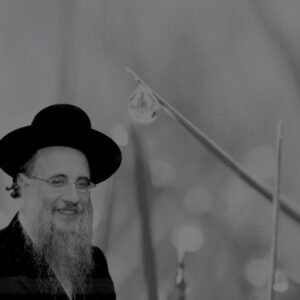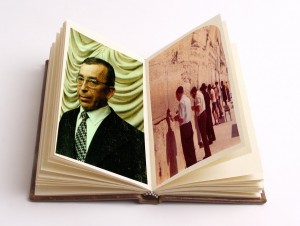Tzvi Aryeh Rosenfeld
Rabbi Tzvi Aryeh’s breadth of knowledge was legendary, as can be seen from the following story which occurred during World War II:
The American Jewish committee was charged with making sure that only serious yeshiva students receive a draft deferment. It occasionally tested the students and any boy who failed was eligible for the draft. One of Rabbi Tzvi Aryeh’s friends was so nervous about failing that he mistranslated a quote that any yeshiva boy would have been able to translate easily. He knew that it was just a matter of days before he would receive his draft notice.
Rabbi Tzvi Aryeh, however, recalled a certain source that explained the quote according to the way his friend translated it. He showed the source to the committee and convinced them that his friend’s answer was actually the correct one. After they saw the high level of scholarship in the yeshiva, they never bothered to test the students again.
***
The leading rabbis of the era, however, were aware of the diamond in their midst. Rabbi Moshe Feinstein would often ask Rabbi Tzvi Aryeh to participate in difficult rabbinical-court judgments and referred to him as, “Torah that is found in a remote corner.” The Lubavitcher Rebbe, Rabbi Menachem Mendel Shneerson, valued Rabbi Tzvi Aryeh’s high level of scholarship and frequently visited with him.
***
When Rabbi Tzvi Aryeh’s father passed away on 22 Menachem Av, 1947, Rabbi Tzvi Aryeh assumed his father’s charitable obligations. Eventually, he raised hundreds of thousands of dollars for many worthy causes. Yet despite the fact that he lived in abject poverty, he never kept any of the money for himself. He sent enormous sums to help the Jews in Eretz Yisrael, and people there assumed that he was quite well-to-do. Those who came to America and paid him a visit were shocked to discover that the palatial Rosenfeld residence was actually a tiny, one-bedroom apartment with four children sharing the bedroom while the parents slept in the living room.
After Rabbi Tzvi Aryeh’s father passed away, he started corresponding with Rav Avraham Sternhartz , leader of the Breslov community in Eretz Yisrael. Eventually the two men developed such a strong relationship that Rabbi Tzvi Aryeh would consult with Rabbi Sternhartz every time he encountered a difficult situation.
***
Rabbi Tzvi Aryeh tried to convince his Talmud Torah students to transfer from public schools to a yeshiva. Yaakov was one student who decided to enter a yeshiva. His mother, however, was opposed. Yaakov’s father and brother had tragically passed away in an accident, and she was petrified that her only son – her pride and joy – would turn into a religious fanatic without a secular education.
The boys in Rabbi Tzvi Aryeh’s group joined together to form “The Ways and Means Committee” whose goal was to find a way to help Yaakov convince his mother to allow him to study in a yeshiva. They decided that Yaakov should go on a hunger strike – eating, of course, as much as he wanted in his friends’ home. Within less than a week Yaakov’s mother succumbed to the pressure and gave her son permission to transfer to a yeshiva.
But when Yaakov’s mother went to her son’s school to take his school records, the non-Jewish principal confirmed her worst fears and convinced her that Yaakov should remain in public school. Yaakov renewed his hunger strike. It wasn’t long before Yaakov’s mother became deathly ill and her doctor informed Yaakov that if he didn’t want to lose her, he had better stop causing her such anguish.
When Rabbi Tzvi Aryeh heard about these developments, he instructed Yaakov to break his hunger strike. Meanwhile, he sent Rabbi Sternhartz a letter asking how to proceed. Rabbi Sternhartz wrote that Yaakov must do whatever is necessary to convince his mother to allow him to study in a yeshiva. He guaranteed that although Yaakov’s mother might appear to be very ill, nothing would happen to her. He explained that it would be impossible for Yaakov to remain religious if he did not study in a yeshiva.
Yaakov, however, could not of watching his mother suffer like that and never transferred to a yeshiva. He remained religious until he turned twenty-one, and then, without any warning, he removed his kippa and left the Jewish world far behind. Sadly enough, Rabbi Sternhartz’s advice was proven correct.
When Rabbi Tzvi Aryeh’s mother was ill with cancer, Rabbi Tzvi Aryeh wrote a letter to Rabbi Sternhartz, asking him to pray for his mother’s recovery. Rabbi Sternhartz wrote back that he could not fulfill Rabbi Tzvi Aryeh’s request. But he did agree to pray that she be saved from undue suffering. Rabbi Tzvi Aryeh’s mother passed away without needing pain killers, despite the fact that she suffered from a type of cancer that is known to be accompanied with excruciating pain.
***
Rabbi Tzvi Aryeh was overwhelmed with grief if one of his students stopped keeping Torah and mitzvos. He mourned the loss almost as deeply if he had lost one of his own children. But although these students did not remain religious, Rabbi Tzvi Aryeh’s sincere words left a deep imprint on their souls. Former students who were now completely irreligious would often visit him years after they left the Talmud Torah. Despite the years that had elapsed, almost all of them were clearly able to recall what they had learned.
- 7 comments



















7 Responses
hi. i want u to know that ive listened to all of the shiruim of r tzvi aryeh rosenfeld that are posted on the bri website, and i am really thirsty for more.i drink up every word and feel a very deep connection to r tzvi aryeh. are there any more shiurim of his available?
also, i understand that there is a biography of his underwork right now. around when will it be ready? thankyou.
Hi under audio we have links to Sichot HaRan, Likutey Moharan and Navi shiurim by Rabbi Rosenfeld. Also if you search “Rosenfeld” in the side wide search you may find a couple more. This is hundreds of hours of audio. Hope this helps.
any progress on the biography
any news about the biography?
Some unique editing challenges, but it will get down B’Ezrat HaShem. Sorry for your patience.
Yossi
Love his shiurim on Navi! I have them all on CD!
is the biography available now and what is it called, where can we purchase it?